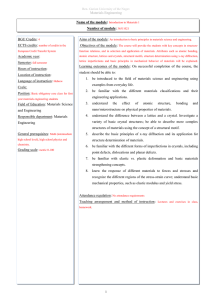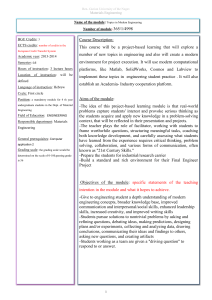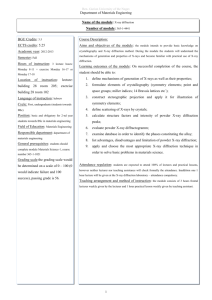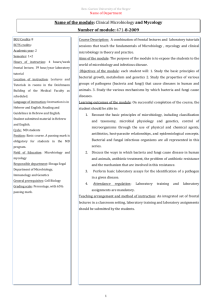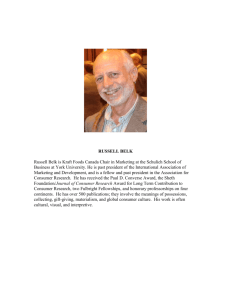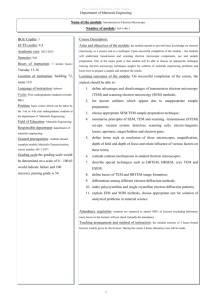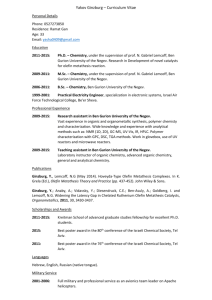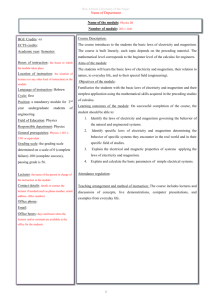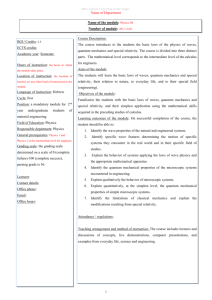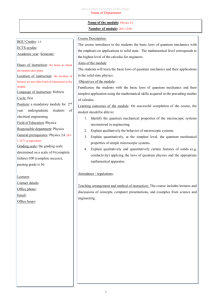Ben- Gurion University of the Negev Department of Materials
advertisement
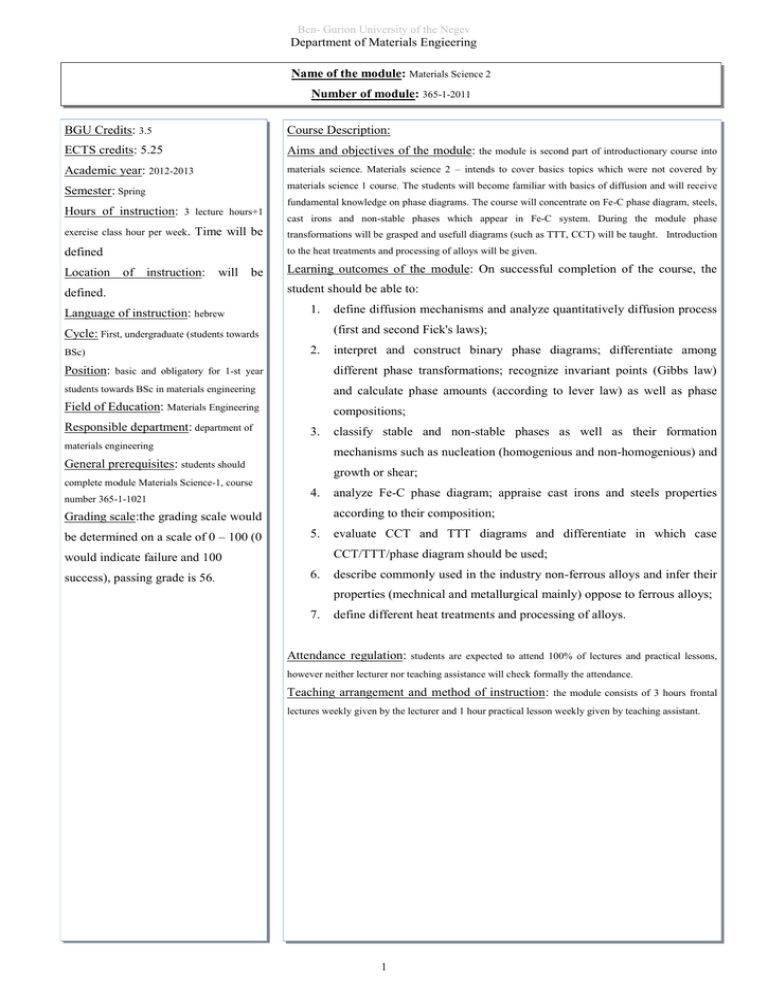
Ben- Gurion University of the Negev Department of Materials Engieering Name of the module: Materials Science 2 Number of module: 365-1-2011 BGU Credits: 3.5 Course Description: ECTS credits: 5.25 Aims and objectives of the module: the module is second part of introductionary course into Academic year: 2012-2013 materials science. Materials science 2 – intends to cover basics topics which were not covered by Semester: Spring materials science 1 course. The students will become familiar with basics of diffusion and will receive Hours of instruction: 3 lecture hours+1 exercise class hour per week. Time will be cast irons and non-stable phases which appear in Fe-C system. During the module phase transformations will be grasped and usefull diagrams (such as TTT, CCT) will be taught. Introduction to the heat treatments and processing of alloys will be given. defined Location of instruction: fundamental knowledge on phase diagrams. The course will concentrate on Fe-C phase diagram, steels, will be defined. Language of instruction: hebrew Learning outcomes of the module: On successful completion of the course, the student should be able to: 1. (first and second Fick's laws); Cycle: First, undergraduate (students towards BSc) define diffusion mechanisms and analyze quantitatively diffusion process 2. interpret and construct binary phase diagrams; differentiate among Position: basic and obligatory for 1-st year different phase transformations; recognize invariant points (Gibbs law) students towards BSc in materials engineering and calculate phase amounts (according to lever law) as well as phase Field of Education: Materials Engineering compositions; Responsible department: department of 3. materials engineering classify stable and non-stable phases as well as their formation mechanisms such as nucleation (homogenious and non-homogenious) and General prerequisites: students should growth or shear; complete module Materials Science-1, course number 365-1-1021 4. according to their composition; Grading scale:the grading scale would be determined on a scale of 0 – 100 (0 5. evaluate CCT and TTT diagrams and differentiate in which case CCT/TTT/phase diagram should be used; would indicate failure and 100 success), passing grade is 56. analyze Fe-C phase diagram; appraise cast irons and steels properties 6. describe commonly used in the industry non-ferrous alloys and infer their properties (mechnical and metallurgical mainly) oppose to ferrous alloys; 7. define different heat treatments and processing of alloys. Attendance regulation: students are expected to attend 100% of lectures and practical lessons, however neither lecturer nor teaching assistance will check formally the attendance. Teaching arrangement and method of instruction: the module consists of 3 hours frontal lectures weekly given by the lecturer and 1 hour practical lesson weekly given by teaching assistant. 1 Ben- Gurion University of the Negev Department of Materials Engieering Assessment: Lecturer: Dr. Louisa Meshi Contact details: room 111, building 59 1. final test 100% Office phone: 972-8-6472576 100% Email: Louisa@bgu.ac.il Office hours: Tuesday 12-14 Work and assignments: each week after the practical lesson additional questions will be given to students as homework. The homework will not be graded – however it's completion is crucial for success Module evaluation: at the end of the module the students will evaluate it through "teaching quality survey". at final exam. Time required for individual work: in addition to attendance in class, the students are expected to do their homework, read additional literature and prepare themselves for final test. Lecturer expects from the students to invest 1 hour weekly Confirmation: the syllabus was and at least 1 full day in order to prepare for final test. confirmed by the faculty academic advisory committee to be valid on 2012-2013 Last update: 10/2012 2 Ben- Gurion University of the Negev Department of Materials Engieering Module Content\ schedule and outlines: 1) diffusion – 2 weeks 2) phase diagrams – 2 weeks 3) Fe-C phase diagram - steels – 2 week; 4) phase transformations including non-stable phases in Fe-C system – 2 week; 5) TTT diagrams - CCT diagrams – 1 week; 6) cast irons; non-ferrous alloys – 1 week; 7) heat treatments and processing of alloys – 1 week; 8) final lecture – includes module summary and preparation for final test – 1 week. Total: 12 weeks*. * ) Semesters which includes 13 weeks allow in depth study of topic number 7 which is given for 2 and not for 1 week. Required reading: none Additional (recommended) literature: 1) “The science and engineering of materials”, Donald R. Askeland, third edition, TA.403.A74.1998 2) “Materials science and engineering. An introduction”, William D. Callister Jr., seventh edition, TA.403.C23.2007 3) , אברהם רוזן, שמואל נדיב, ברנדון. דוד ג, דניאל אלון,""מבוא להנדסת חומריםTA.403.M35 * All learning material will be available to the students on the module's website (high-learn)/ library/ electronic documents available to BGU students. 3 Ben- Gurion University of the Negev Department of Materials Engieering 4 Ben- Gurion University of the Negev Department of Materials Engieering 5 Ben- Gurion University of the Negev Department of Materials Engieering 6 Ben- Gurion University of the Negev Department of Materials Engieering 7 Ben- Gurion University of the Negev Department of Materials Engieering 8
